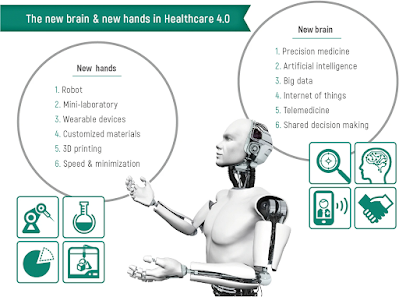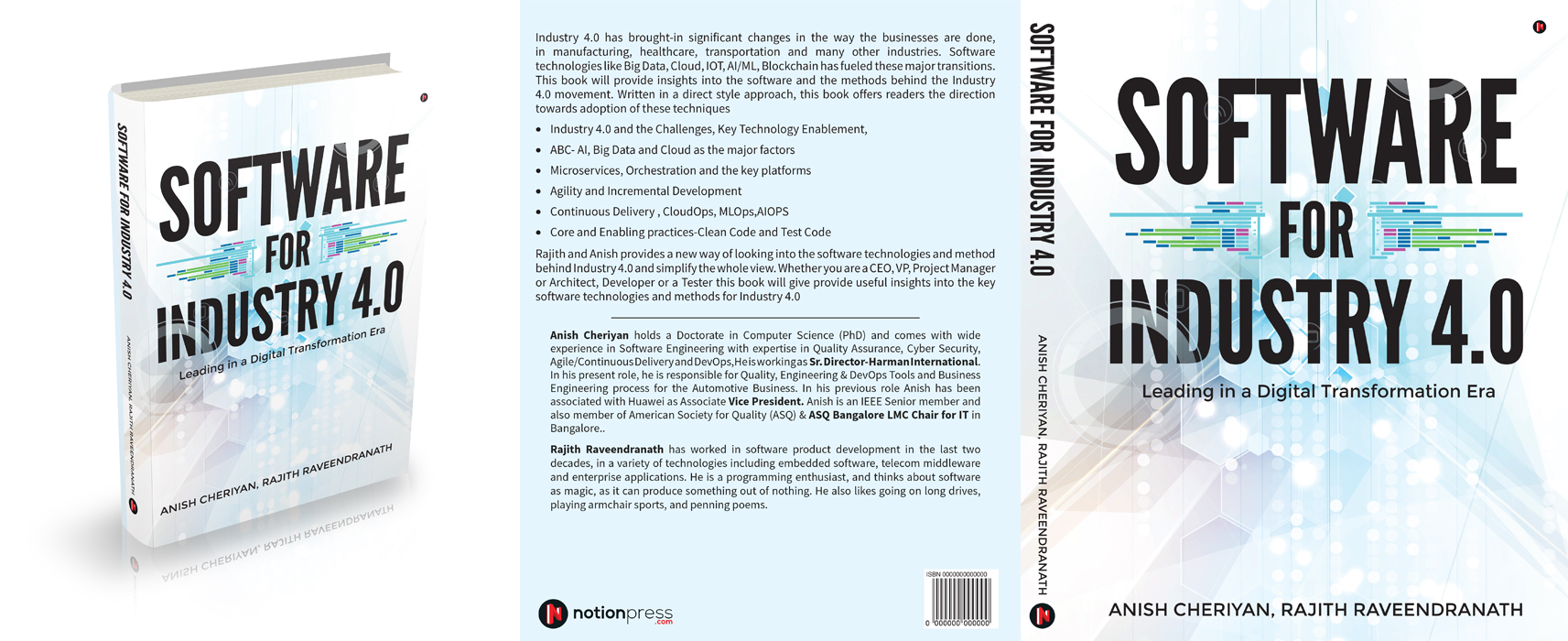Industry 4.0 in Healthcare : Enabling Healthcare 4.0 using IoT, AI, Big data & cloud computing.
Image Reference- https://link.springer.com/article/10.1007/s10916-019-1513-0/figures/2
Industry 4.0 and its core technologies - AI , Big Data and Cloud information are completely revolutionizing both services and production worlds. In many sectors, these technologies are driving a major impact on the way we live and work.
The healthcare sector is also discovering that these technologies could also be the key to delivering better care to patients. Internet of Things, Cloud, AI and Big Data technologies are revolutionizing healthcare, moving it towards Healthcare 4.0. Increasing penetration of these technologies in the healthcare domain is powering various kinds of applications.
Real Time healthcare applications make use of connected IoT sensors and devices to collect and monitor patient’s vital statistics in real time and help alert doctors when critical abnormality is detected.
Near-Real Time healthcare applications process sensor data in the cloud delivering key insight about patient health in near real time. Some of the near real-time use cases include collective analysis of multiple sensor information and correlating them with aggregated data from other patients to infer statistical variances and demographic trends.
Batch/Offline healthcare applications use artificial intelligence and machine learning on the cloud to analyze historical stats about a patient's health parameters to diagnose chronic diseases such as cardiac health, diabetes etc..
Wearables and Sensors
Wearable devices such as smartwatches and fitness trackers have already made a difference to the personal fitness & healthcare sector by helping people track their heart rate, cardiac rhythms, fitness, exercise routine and effectiveness. What we are seeing today is just a tip of the iceberg that is yet to reveal itself in the full. The potential of smartwatches and other wearable devices to revolutionize healthcare is much greater than what people realize.
In the medical landscape, these devices can help doctors and nurses remotely monitor and track a patient’s condition wherever they are. Doctors could also receive alerts about significant changes in certain health parameters that require immediate attention. For example, Movement Disorder API in Apple’s smartwatches allow doctors to gather more information on Parkinson’s disease by tracking smartwatch wearers.
Big Data & Cloud
While wearable devices and embed numerous sensors which help doctors monitor the health and vital stats of individual patients. The potential application of these devices is magnified further by Big data and cloud computing. Multitudes of incoming sensor data from millions of devices can be anonymously analyzed, collectively processed and aggregated to generate insights of public health. For instance, SPO2 sensors, skin temperature and GPS sensors gather blood oxygen, body temperature and location respectively. Processing this data anonymously on the cloud could help generate insights about possible COVID hotspots and rate of change in public health situations.
Artificial Intelligence and Machine Learning
With the large amount of vital health stats that are available at scale, AI and ML algorithms could be used to detect patterns and correlations that would help in early detection of several life threatening conditions and diseases. For instance, Fitbit recently rolled out the capability of AFib detection even on devices without an ECG sensor. AFib or Atrial fibrillation is an irregular heart rhythm and occurs when the upper chambers beat out of sync with the lower chambers. This can increase risk of blood clots, stroke and heart attack. Adults over 40 have a 1 in 4 risk of developing AFib in their lifetime.
This could be made possible only through the use of machine learning algorithms trained over vast amounts of sensor data gathered collectively.
Industry 4.0 provides numerous opportunities and capabilities to health care systems engineering. Soon, we’ll have a world where anyone can access the healthcare support that they need in an instant. Healthcare professionals will be able to perform better and early diagnosis/detection of critical illness improving cure and recovery rates..
Although it’s difficult to know for sure what the future might hold, what we can say for sure is that technology will have a significant impact in the healthcare industry. Healthcare 4.0 is the start of a new era for healthcare, revolutionizing experience for both doctors and patients in the years to come.
Importance of Privacy
With the personal identifiable information available with the service providers whether it is cloud vendors/ wearable vendors or any other, it is important that privacy of the customer is given the utmost attention. Evey system should be designed in such a way that it identifies the sensitive data and the overall data life cycle. The system should treat data that is sensitive and have provisions about providing appropriate access controls. There are standards across various countries and industries that are helping in driving standardization in this context. For example in EU regions, GDPR- General Data protection Regulation is followed for data security and privacy protection. Some of the international legal standards for privacy can be referred from the Wikipedia link - https://en.wikipedia.org/wiki/Privacy_law . With more advancement in technology and availability of wearable devices, Healthcare is definitely moving in a direction that diseases can be detected early and appropriate alert mechanisms can be built-in to drive early actions. With the context of privacy also getting considered in the overall solution, users become more confident and there can be widespread adoption of these technologies.




Comments
Post a Comment